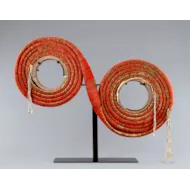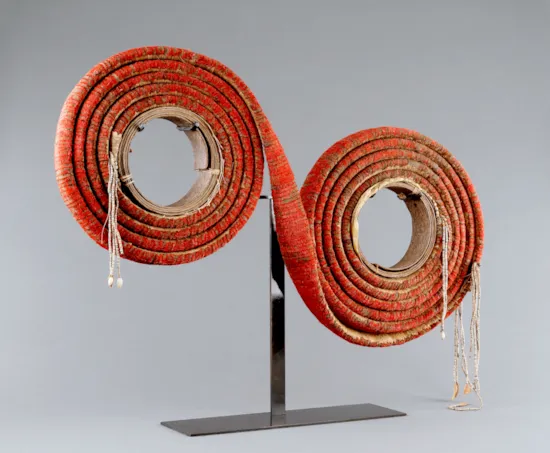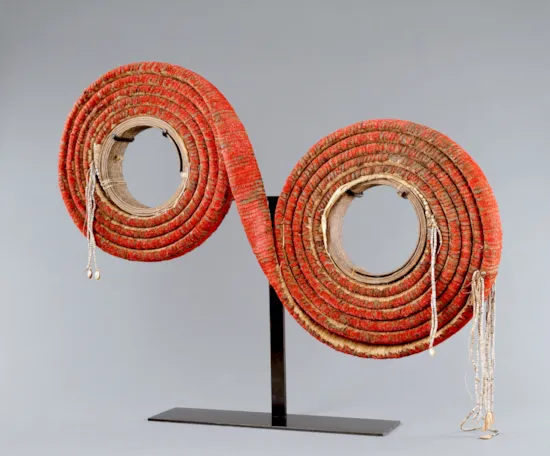A Rare Double Roll of Pacific Santa Cruz, Red Feather Currency ‘Tevau’
A Rare Double Roll of Pacific Santa Cruz, Red Feather Currency ‘Tevau’
Plant fibre, bark strips, red bird feathers, small shells, glass beads
Solomon Islands
19th Century
Size: approx: 45cm high, 80cm wide, 6.5cm deep - 17¾ ins high, 31½ ins wide, 2½ ins deep
height with stand approx: 61cm high - 24 ins high (max)
Plant fibre, bark strips, red bird feathers, small shells, glass beads
Solomon Islands
19th Century
Size: approx: 45cm high, 80cm wide, 6.5cm deep - 17¾ ins high, 31½ ins wide, 2½ ins deep
height with stand approx: 61cm high - 24 ins high (max)
A Rare Double Roll of Pacific Santa Cruz, Red Feather Currency ‘Tevau’
Plant fibre, bark strips, red bird feathers, small shells, glass beads
Solomon Islands
19th Century
Size: approx: 45cm high, 80cm wide, 6.5cm deep - 17¾ ins high, 31½ ins wide, 2½ ins deep
height with stand approx: 61cm high - 24 ins high (max)
Plant fibre, bark strips, red bird feathers, small shells, glass beads
Solomon Islands
19th Century
Size: approx: 45cm high, 80cm wide, 6.5cm deep - 17¾ ins high, 31½ ins wide, 2½ ins deep
height with stand approx: 61cm high - 24 ins high (max)
These remarkable forms of Pacific Island currency are made of elaborate coils of red feathers taken from the scarlet honey-eater (Myzomela Cardinalis) and were the basis for a trading network between the neighbouring islands of the Solomons. In Polynesian societies the colour red was significant, it was the colour of the gods, used for the personal adornment of chiefs who believed they were the embodiment of the gods. The only source of a permanent bright red colour came from the feathers of certain birds and particularly brilliant red feathers are found on the scarlet honeyeater.
Today, with modern life dominated by coins, banknotes, cheques and credit cards, it is difficult to understand how societies could function without conventional money. However, alternative forms of currency were once widespread throughout the world. Routine daily transactions relied on barter; a fisherman would exchange a few fish with a farmer for some of his crop, but bartering systems don’t work when you want to buy in quantity or obtain something of exceptional value. Thus, in the Solomon Islands the precious rolls of red feathers acted like a pile of banknotes or a large cheque, enabling pigs to be purchased for a feast day, or for a wife to be bought, with the whole community recognising these exchanges as being of great and permanent value.
As both metal ores and fossil coal deposits are not found in the Pacific a currency based on metal coins did not develop. Alternative currencies based on objects made from scarce natural resources that took a great deal of time and skill to make were developed, of which the Santa Cruz red feathers money is the most intricate and spectacular.
Today, with modern life dominated by coins, banknotes, cheques and credit cards, it is difficult to understand how societies could function without conventional money. However, alternative forms of currency were once widespread throughout the world. Routine daily transactions relied on barter; a fisherman would exchange a few fish with a farmer for some of his crop, but bartering systems don’t work when you want to buy in quantity or obtain something of exceptional value. Thus, in the Solomon Islands the precious rolls of red feathers acted like a pile of banknotes or a large cheque, enabling pigs to be purchased for a feast day, or for a wife to be bought, with the whole community recognising these exchanges as being of great and permanent value.
As both metal ores and fossil coal deposits are not found in the Pacific a currency based on metal coins did not develop. Alternative currencies based on objects made from scarce natural resources that took a great deal of time and skill to make were developed, of which the Santa Cruz red feathers money is the most intricate and spectacular.
Acquired directly in 1983 on Temotu Island from Joseph Olu, a local Elder / Chief, whose family had owned the ‘Tevau’ for generations
Ex Private collection
Ex Private collection
A Rare Double Roll of Pacific Santa Cruz, Red Feather Currency ‘Tevau’








